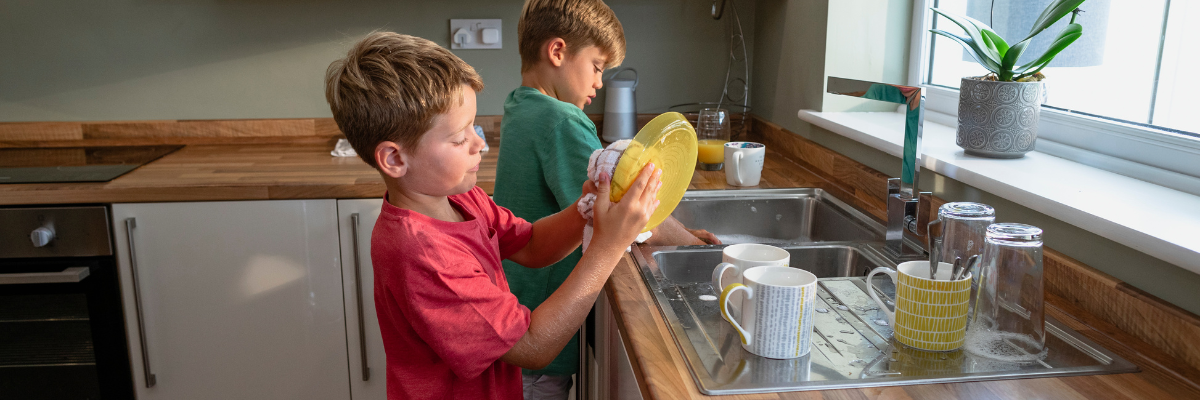Chores can be essential to a child’s development, helping them build responsibility, independence, and various motor skills. Pediatric occupational therapists often recommend specific chores based on a child’s age to optimize their development and ensure appropriate and manageable tasks. Here’s a guide on the best chores for kids by age, highlighting how these activities can benefit their growth.
Ages 2-3: Building Basic Skills
Chores:
– Picking Up Toys: Encourages organization and fine motor skills.
– Wiping Spills: Helps with motor coordination and understanding cause and effect.
-Putting Clothes in Hamper: Teaches responsibility and hand-eye coordination.
Benefits:
– Motor Skills: These chores enhance fine and gross motor skills through simple movements.
– Cognitive Development: Understanding instructions and following through improves cognitive abilities.
– Responsibility: Starting with simple tasks helps instill a sense of duty and accomplishment.
Ages 4-5: Enhancing Coordination and Responsibility
Chores:
– Setting the Table: Develops sequencing skills and hand-eye coordination.
– Feeding Pets: Teaches empathy, responsibility, and routine.
– Watering Plants: Enhances motor skills and an understanding of plant care.
Benefits:
– Coordination: Tasks that involve multiple steps improve coordination and planning.
– Responsibility: Regular chores like feeding pets build a routine and sense of duty.
– Cognitive Skills: Following more complex instructions aids cognitive development.
Ages 6-7: Introducing Independence
Chores:
– Making the Bed: Encourages independence and fine motor skills.
– Sorting Laundry: Teaches categorization and organization.
– Clearing the Table: Develops responsibility and an understanding of teamwork.
Benefits:
– Independence: These chores promote self-reliance and the ability to complete tasks without assistance.
– Organizational Skills: Sorting laundry and clearing the table enhance organizational abilities.
– Motor Skills: Making the bed involves coordination and fine motor skills.
Ages 8-10: Building Competence and Confidence
Chores:
– Vacuuming: Enhances gross motor skills and a sense of thoroughness.
– Taking Out the Trash: Teaches responsibility and the importance of cleanliness.
– Folding Laundry: Develops fine motor skills and attention to detail.
Benefits:
-Competence: Successfully completing more complex chores builds competence and confidence.
– Responsibility: Regular tasks like taking out the trash teach the importance of contributing to household upkeep.
– Motor Skills: Folding laundry and vacuuming involve both fine and gross motor skills.
Ages 11-13: Encouraging Independence and Time Management
Chores:
– Cooking Simple Meals: Teaches life skills, safety, and time management.
– Mowing the Lawn: Enhances gross motor skills and responsibility.
– Cleaning Bathrooms: Develops an understanding of hygiene and thoroughness.
Benefits:
– Life Skills: Cooking and other complex chores prepare kids for future independence.
– Time Management: Balancing chores with other activities helps develop time management skills.
– Responsibility: Taking on significant chores like cleaning bathrooms fosters a deeper sense of responsibility.
Ages 14-17: Preparing for Adulthood
Chores:
– Managing Finances: Teaches budgeting, saving, and financial responsibility.
– Grocery Shopping: Develops planning skills and an understanding of nutrition.
-Maintaining Vehicles: Teaches practical skills and the importance of upkeep.
Benefits:
– Adulting Skills: These chores prepare teens for adult responsibilities and independence.
– Financial Literacy: Managing finances instills essential budgeting and saving habits.
– Practical Skills: Tasks like vehicle maintenance provide practical knowledge useful in adulthood.
How can Carolina Therapy Connection help?
Incorporating age-appropriate chores into your child’s routine can significantly aid their development. Pediatric occupational therapists emphasize the importance of tailoring tasks to a child’s age and capabilities to foster motor skills, cognitive development, and a sense of responsibility. As children grow, their chores should evolve to challenge them appropriately and prepare them for future independence. Encouraging kids to participate in household chores not only helps them develop crucial life skills but also fosters a sense of accomplishment and confidence.

